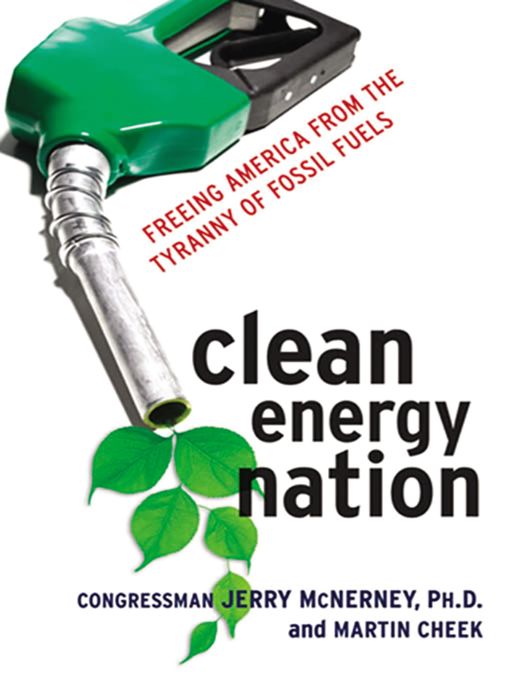
Clean Energy Nation
Freeing America from the Tyranny of Fossil Fuels
کتاب های مرتبط
- اطلاعات
- نقد و بررسی
- دیدگاه کاربران
نقد و بررسی

August 2, 2010
What one change could preserve democracy, increase national security, reduce health care costs, increase business output, and improve public health? U.S. Congressman and renewable energy engineer McNerney (of Pleasanton, Calif.), with tech journalist Cheek, cover the history and future with fossil fuels, illustrating the enormous potential of renewable energy-including solar, wind, biomass, nuclear, geothermal, water, and hydrogen-to head off a grim fate for Western civilization, from diminishing food supplies to setbacks in education. With milestones including 75 percent energy independence from OPEC by 2020, the authors compare their goal to the American Revolution in importance and scope, but never grow sanctimonious. In measured language, this volume reviews current, past and future U.S. policy, as well as renewable energy projects and goals around the world, concluding with concrete suggestions for implementing clean energy (including education, international partnerships and financing). Addressing skeptics, the authors question whether "our nation's free market system truly benefits by providing petroleum companies with substantial financial subsidies," and make a convincing case for other arrangements.

February 1, 2009
Comprehensive guide to America's looming energy emergency, including suggested actions that the authors believe will avert a global crisis.
War, pestilence, starvation and the collapse of the global economy are just some of the consequences of not moving aggressively toward energy independence, assert Congressman McNerney—a member of House committees on Global Warming and Energy Independence and on Science and Technology—and science and technology journalist Cheek. They outline the many dangers of ignoring the Peak Oil Theory, which predicts that the world's oil output will begin to decline in the near future. With growing economies like China increasing their fossil fuel use and developing strategic alliances with oil-rich countries that are not allies of the United States, the authors argue, there is no time to waste in implementing lower emission standards and greater use of alternative energy sources, including solar, wind, water, biofuel, geothermal and possibly nuclear power. Oil dependence affects citizens' daily lives in myriad ways, impacting not just transportation but the manufacture of medicines, maintenance of the military and national security, preservation of agriculture and the food supply and the heating and cooling of homes and businesses. Unless tough standards are met in the next decade, the United States will assume an increasingly weak position within the global oil marketplace. The number of barrels of crude oil produced domestically is already far short of U.S. consumption rates, and progress in Washington has been hindered by recent administrations unduly influenced by the oil industry. The authors present a plan to reduce oil dependence from OPEC nations by 75 percent by the year 2020. If the incoming administration can immediately prioritize the development of clean, abundant, natural energy, they write, the United States can emerge victorious from this transition period and retain its reputation as the world's most innovative and autonomous country,"the peace power of the twenty-first-century world."
Expert and invigorating.
(COPYRIGHT (2009) KIRKUS REVIEWS/NIELSEN BUSINESS MEDIA, INC. ALL RIGHTS RESERVED.)

June 15, 2011
Congressman McNerney and journalist Cheek tell America's energy story, past, present, and future. After a grim assessment of the world's dwindling fossil fuel supply and our status as "addicts," they provide a survey of new technologies that could provide viable alternatives. The authors demonstrate how energy issues permeate society by viewing them from the perspectives of government, environment, economy, transportation, agriculture, public health, and education. They make some good points, perhaps the strongest of which is the importance of framing energy policy as a national security problem, rather than a solely environmental one. All too often, though, kernels are buried beneath layers of blather; McNerney is overly fond of the journey metaphor--of standing at the crossroads, of keeping liberty's flame lit. Their patriotic impulse strains the limits of patience when readers are asked to remember America's great technological achievements (e.g., transcontinental railroad, interstate highway system, Apollo space mission), as if those memories can cure an addiction, generate effective policy, or solve a problem as utterly different and complex as energy. VERDICT Readers expecting McNerney, uniquely qualified as both energy expert and congressman, to deliver fresh insight will be disappointed.--Robert Eagan, Windsor P.L., Ont.
Copyright 2011 Library Journal, LLC Used with permission.

























دیدگاه کاربران